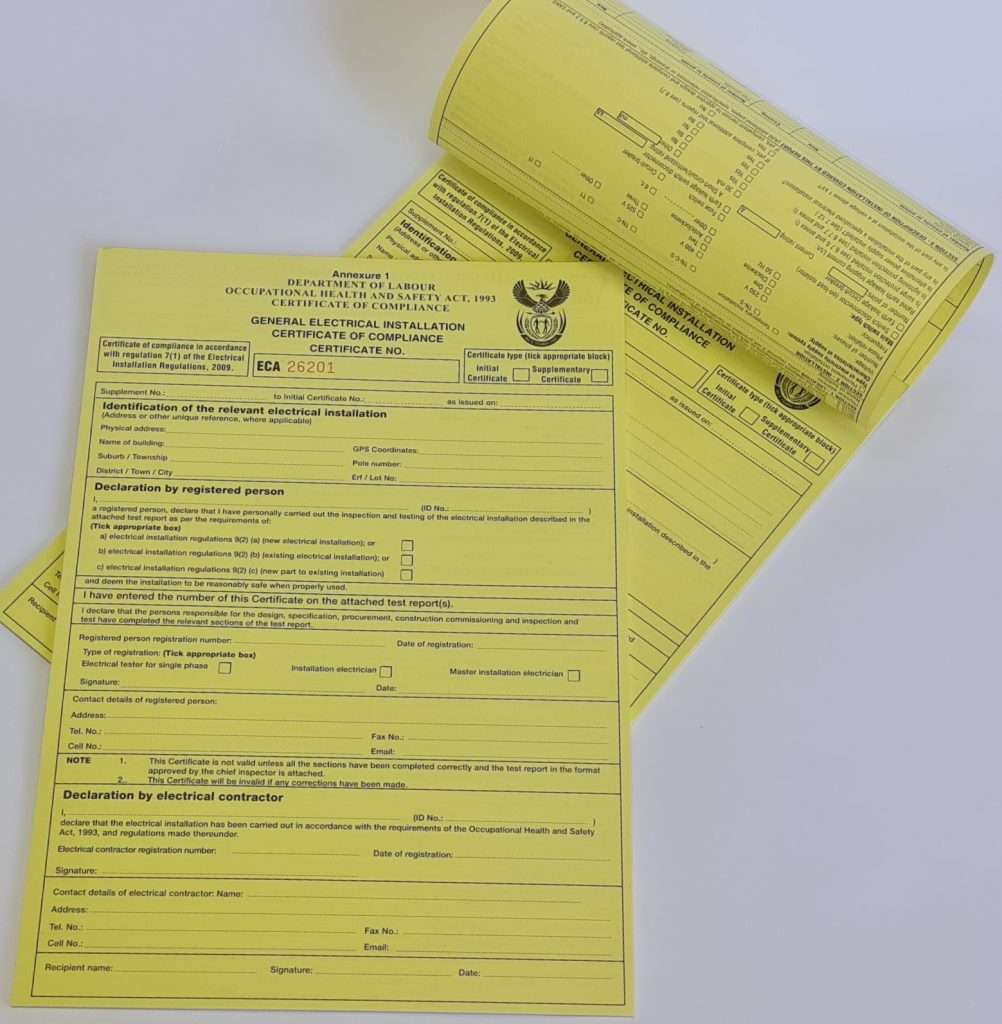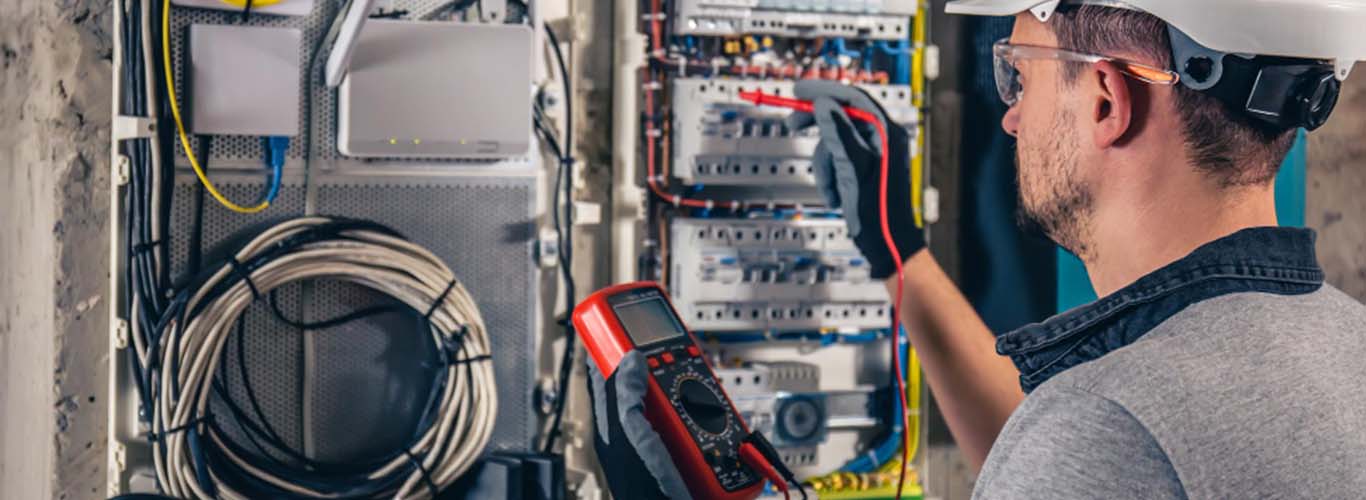Table of Contents
Send us a message

Electrical compliance certificates play a crucial role in ensuring electrical installations’ safety and regulatory compliance. These certificates serve as official documentation verifying that electrical work has been performed per applicable safety standards, codes, and regulations.
While the specific requirements for electrical compliance certificates can vary depending on the type of work and local regulations, obtaining these certificates is generally recommended to protect the well-being of individuals, comply with legal obligations, and provide peace of mind for property owners.
Advantages of Electrical Compliance Certificates
- Ensure safety and reduces the risk of electrical accidents or hazards.
- Demonstrate compliance with legal regulations and requirements.
- Validate insurance coverage and claims related to electrical work.
- Enhance the value and marketability of properties.
- Provide peace of mind knowing that electrical installations meet safety standards.
- Establish a professional reputation for electricians and contractors.
- Protect individuals and properties from potential electrical risks.
- Document the quality and compliance of electrical work.
- Provide evidence of professional and responsible practices.
- Facilitate smooth property transactions and rentals.
Types of Electrical Testing
In the United Kingdom, the following are the commonly recognised types of electrical certificates:
Electrical Installation Certificate (EIC):
This certificate is used for new electrical installations or significant modifications to existing installations. It verifies that the electrical work has been performed in compliance with the UK wiring regulations (BS 7671) and other applicable standards.
Minor Electrical Installation Works Certificate (MEIWC):
MEIWC is issued for minor electrical works or repairs that do not involve major alterations. It confirms that the electrical work has been carried out safely and meets the necessary safety standards.
Electrical Installation Condition Report (EICR):
Formerly known as the Periodic Inspection Report (PIR), this certificate is generated after a thorough inspection and testing of an existing electrical installation. It assesses the condition of the installation, identifies any defects or potential hazards, and provides recommendations for remedial actions.
Portable Appliance Testing (PAT) Certificate:
This certificate is issued after the inspection and testing of portable electrical appliances. It confirms that the appliances have been tested for safety and comply with relevant standards.
Emergency Lighting Completion Certificate:
This certificate is specific to emergency lighting systems installed in buildings. It verifies that the emergency lighting system has been installed, tested, and properly working.
Electrical Safety Certificates
24Hr Emergency Electricians
Our team of emergency response electricians are on call 24/7
Fair Price
Our pricing structure is transparent and affordable. We offering great value for money
When Do I Need Electrical Compliance Certificates?
Electrical compliance certificates are typically needed in the following situations:
New Electrical Installations:
An electrical compliance certificate is generally required whenever a new electrical installation is carried out, such as in a new building or a significant extension or alteration to an existing installation. This certificate confirms that the electrical work has been completed in compliance with the applicable wiring regulations, safety standards, and local regulations.
Significant Modifications or Alterations:
If you are making substantial modifications or additions to an existing electrical installation, you will likely need an electrical compliance certificate. This ensures that the modifications or additions meet the required safety standards and regulatory requirements.
Periodic Inspections and Testing:
Regular inspections and testing of electrical installations are necessary to assess their condition and ensure ongoing compliance with safety regulations. An electrical compliance certificate, such as an Electrical Installation Condition Report (EICR), is typically issued after a thorough inspection and testing of an existing installation.
Portable Appliance Testing (PAT):
In some cases, portable electrical appliances used in workplaces or rented properties need to undergo periodic Portable Appliance Testing (PAT) to ensure their safety. A PAT certificate is issued after the testing is completed, providing evidence that the appliances comply with safety standards.
Benefits of Hiring a Registered Electrician
Using a registered electrician offers several benefits and advantages. Here are some key benefits:
Expertise and Qualifications:
Registered electricians have undergone appropriate training, education, and assessments to acquire the necessary skills and knowledge in electrical work. They are qualified professionals who are familiar with the latest electrical regulations, safety standards, and industry best practices. Their expertise ensures that electrical work is carried out safely, efficiently, and in compliance with the applicable standards.
Compliance with Regulations:
Registered electricians are knowledgeable about local electrical regulations and codes. They understand the legal requirements and ensure that the electrical work is performed in accordance with these regulations. This helps to prevent potential legal issues and ensures compliance with safety standards.
Safety and Quality Assurance:
Safety is paramount when it comes to electrical installations. Registered electricians follow strict safety protocols to protect you, your property, and others from electrical hazards. Their work undergoes rigorous inspections and is held to high standards, providing peace of mind that the electrical systems are safe and reliable.
Insurance Coverage:
Many insurance companies require that registered electricians perform electrical work to validate coverage. Using a registered electrician ensures that your insurance policy remains valid and that you are protected in case of any electrical incidents or damage.
Warranty and Guarantees:
Registered electricians often provide warranties or guarantees for their workmanship. If any issues arise with the electrical installation or related components within the warranty period, they will rectify them at no additional cost. This adds an extra layer of protection and reassurance.
Compliance Certificates:
Registered electricians are authorised to issue Electrical Compliance Certificates or other relevant certificates often required for certain electrical work. These certificates provide official documentation that the electrical work has been carried out safely and in accordance with the necessary regulations.
Professionalism and Accountability:
Registered electricians adhere to a code of conduct and professional ethics. They prioritise customer satisfaction, communicate effectively, and maintain high professionalism. You have a recourse mechanism through their professional registration body if any concerns or issues arise.

How to Choose a Registered Electrician?
Research and Recommendations:
Start by conducting research and gathering recommendations from trusted sources, such as friends, family, neighbours, or colleagues who have recently used the services of an electrician. Online directories and review websites can also provide valuable insights into the reputation and quality of electricians in your area.
Verify Registration and Credentials:
Check if the electrician is registered with a recognised professional regulatory body or scheme. These schemes ensure that electricians meet the required standards and have appropriate qualifications. Verify the registration details on the scheme’s website or contact the regulatory body directly to confirm the electrician’s credentials.
Experience and Specialisation:
Consider the electrician’s experience and specialisation. Look for someone with relevant experience in the type of electrical work you require. For instance, if you need electrical work in a commercial setting, choose an electrician with experience in commercial installations. Experience brings expertise and understanding of specific challenges and requirements.
Insurance and Guarantees:
Ensure that the electrician has appropriate liability insurance coverage. This protects you from potential damages or accidents that may occur during the electrical work. Inquire about any warranties or guarantees provided for the work performed.
References and Reviews:
Request references from the electrician and reach out to past clients to inquire about their experiences. Additionally, check online reviews and ratings to get an overall impression of the electrician’s reputation and customer satisfaction levels.
Communication and Professionalism:
Evaluate the electrician’s communication skills and professionalism. A reliable electrician should respond promptly, listen to your needs, provide clear explanations, and address any concerns or questions you may have.
Obtain Multiple Quotes:
Obtain detailed quotes from multiple registered electricians for comparison. The quotes should include a breakdown of costs, materials, labour, and any additional charges. While price is a factor, prioritise quality and reliability when making your decision.
